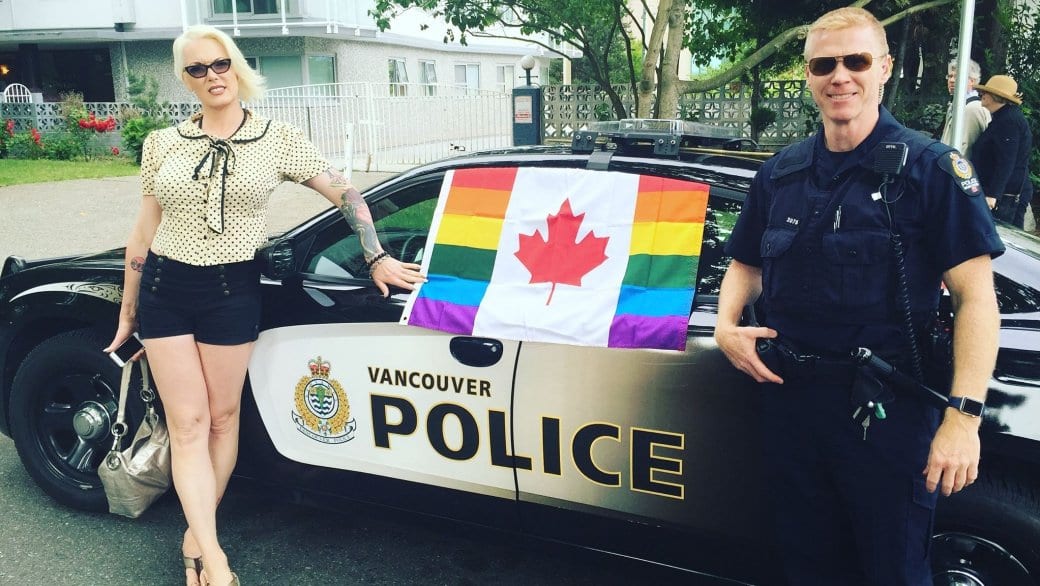Velvet Steele says the Vancouver Police Department’s new transgender policy is a small step in the right direction toward acceptance and education.
“If the police are implementing this policy, I see it as something that will have a trickle-down effect for everyone else, including fire departments, the private sector and the public sector,” says Steele, who co-stars in a new sensitivity training video for the VPD to better understand trans people’s experiences.
“This [new policy] informs how they will all deal with individuals in the transgender community,” she says.
The new policy will ensure that transgender and non-binary people are addressed by their preferred name and pronoun; even if it’s different from the name and gender markers on their government-issued identification.
“These are stepping stones and baby steps,” Steele continues. “We can’t ram things down everyone’s throats right off the bat so we’ve been working hard on this for some time.”
In 2002, Steele was bashed by a group of about nine teens who shouted “fucking faggots” before attacking her and breaking three of her fingers. At the time, she said, the officer failed to arrest the suspects even though they were still at the scene, and refused to give Steele a business card with her badge number.
“I haven’t been on the receiving end of the new policy but I can tell you that [the VPD] have been dealing with me most admirably since 2002,” Steele says now.
The VPD’s new policy was prompted by a 2015 BC Human Rights Tribunal case between the force and a transgender woman, who was refused access to medical care in jail and referred to by her previous name.
“The VPD has engaged in systemic discrimination of trans people concerning their identification,” wrote tribunal member Catherine McCreary in her decision. “Within one year, policies are to be adopted by VPD that allow identification of trans people without discrimination. Officers are to be trained in implementation of these policies.”
The policy and the training video titled “Walk With Me” will now be distributed to all VPD employees, and the VPD will provide further training to VPD staff in 2017.
(The Vancouver Police Department’s new training video, Walk With Me, was released June 16, 2016./VPD/Youtube)
“The VPD values and respects the diversity of Vancouver, and recognizes that each community may have unique needs related to policing,” says Drazen Manojlovic, director of the VPD’s planning, research and audit section, in a statement.
“This policy and procedure strikes an appropriate balance between VPD members’ legal responsibility to verify identity in official reports, while being respectful to the transgender person’s right to be referred to by the name and gender identity they have chosen, while also complying with the BC Human Rights Tribunal’s order,” Manojlovic says in the statement.
The VPD says it developed the new policy in partnership with its own and the City of Vancouver’s LGBT advisory committees and the board of the Trans Alliance Society.
“We are overjoyed an incredibly pleased that the VPD has taken such forward action and their video ‘Walk With Me’ I think really shows how progressive they are trying to be and how much they are trying to update their policies,” says Rachaal Steele, who co-chairs the city’s LGBT advisory committee. “They have been in consultation with us the whole time, which has been great.”
Trans Alliance Society chair Morgane Oger says the new policy is meant to ensure that transgender people are treated with respect in all police interactions.
“Ultimately we are trying to avoid a situation where a police officer decides what someone’s gender identity is,” she says.
“If a person expresses that their gender identity doesn’t match their government documents then the officer is required, under the risk of reprimand, to comply with the gender identity of person as the person expresses it,” she says.
(Morgane Oger is pleased with the new policy overall./Nathaniel Christopher/Daily Xtra)
Under the new policy, police officers must respect the preference of each individual, but they are not required to record that a person is transgender. “The fact that a person is transgender is private information,” Oger explains. “A transgender person may volunteer that information without worrying that the information will be recorded.”
Oger says the new system isn’t perfect, though. The VPD says it’s still required to enter the identity of every person — as it appears on their government-issue identification — into their database, Oger says.
Oger says this is not a poor reflection of the policy itself but a structural shortcoming.
“One of the shortcomings is the VPD doesn’t control the computer system they use,” Oger explains, noting the VPD uses a provincial police records management system with limited input options.
“We wanted to find the least painful way to match the needs of the system,” Oger says. “So rather than using aliases, we’d just enter the identity for the primary records document, and then in the narrative section, where [the officers] describe the incident, they add the shortest possible description, such as ‘Lucy Smith prefers the name John Doe.’”
Overall, Oger is pleased with the policy and says it will address a lack of education and knowledge about transgender people.
“The policy is mandatory reading, and the police video is mandatory viewing for VPD staff and officers alike, and every member of the VPD will be required to prove they read the policy and video,” she says.
For more information on the new policy:
Tweet the Vancouver Police Department’s LGBT liaison officer Const Dale Quiring
Email Trans Alliance Society chair Morgane Oger

 Why you can trust Xtra
Why you can trust Xtra


